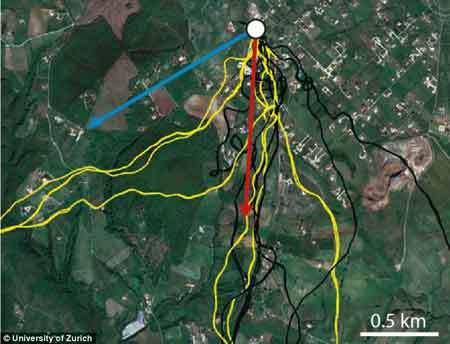双语:科学家发现鸽子脑内自带空间图
 蓝箭头指示喂食鸽房的方向,红箭头指示鸽房方向,白点为放飞地点。黄色表示饥饿鸽子的飞行路线,黑色表示喂过食鸽子的飞行路线。
蓝箭头指示喂食鸽房的方向,红箭头指示鸽房方向,白点为放飞地点。黄色表示饥饿鸽子的飞行路线,黑色表示喂过食鸽子的飞行路线。原文
The mystery of how a pigeon can always find its way back home has finally been solved。
Scientists believe that pigeons have a spatial map that allows them to fly in an unfamiliar territory and know exactly where they are going。
The finding replaces the current theory that pigeons compare the coordinates of their location with those of the home loft and then systematically reduce the difference between the two to find their way home。
This earlier theory likens the navigation of pigeons to that of flying robots。
But experiments carried out at the University of Zurich have shown that pigeons possess cognitive capabilities。
In unknown areas, the scientists claim pigeons recognise where they are in relation to their home loft and are able to choose their targets themselves。
Homing pigeons and migratory birds determine their flight direction with the help of the Earth’s magnetic field, the stars and the position of the sun。
Nicole Blaser, a doctoral student in biology at the University of Zurich proposed the theory that pigeons have a spatial understanding and knowledge of their position in space relative to their home loft。
This theory presupposes a type of mental map in their brain and thus cognitive capabilities. Up until now, there has not been any clear evidence to support this。
For their experiments, Blaser and her colleagues fitted homing pigeons with miniature GPS loggers in order to monitor the birds’ flight paths。
Beforehand the researchers trained the pigeons not to obtain food in the home loft, as was normally the case otherwise。
‘We fed the pigeons in a second loft around thirty kilometres away, from where they each had to fly back to their home loft’, said Blaser, explaining the structure of the experiment。
The scientists then brought the pigeons to a third place unknown to the pigeons in completely unfamiliar territory。
This release site was in turn 30 kilometres from the home loft and the food loft. Natural obstacles obscured visual contact between the release site and the two lofts。
One group of the pigeons was allowed to eat before flying home. The other group was kept hungry before starting off。
‘We wanted to find out whether the hungry pigeons fly first to the home loft and from there to the food loft or whether they are able to fly directly to the food loft,’ said Blaser。
‘As we expected, the satiated pigeons flew directly to the home loft’, said professor Hans-Peter Lipp, neuroanatomist at the University of Zurich。
‘They already started on course for their loft and only deviated from that course for a short time to make topography-induced detours.’
The hungry pigeons behaved differently, setting off on course for the food loft from the very beginning and flying directly to that target。
They also flew around topographical obstacles and then immediately adjusted again to their original course。
Based on this evidence, Blaser believes that pigeons can determine their location and their direction of flight relative to the target and can choose between several targets。
Blaser concluded that pigeons have a type of cognitive navigational map in their heads and have cognitive capabilities。
‘Pigeons use their heads to fly’, she said。
查看译文
据英国《每日邮报》7月26日报道,瑞士苏黎世大学的科学家经过实验得出结论:鸽子大脑中有一幅空间地图,因而能够在陌生地区飞行,并能判断出确切的飞行方向。
现有理论认为,鸽子把自己所处的位置坐标与家里的鸽房坐标相比较,有条理地减小两者之间的区别,进而找到回家的路。以往的研究认为,信鸽和候鸟在地球磁场、星星和太阳位置的帮助下确定飞行方向。而苏黎世大学生物学博士尼科尔 布莱泽则提出新的理论:鸽子具有空间识别能力,知道自己相对于鸽房的空间位置。该理论预先假定鸽子的大脑中有一种意象图,因而具有认知能力。在此之前,没有任何显著证据支持这一理论。
在实验中,布莱泽和同事在信鸽身上安装了微型GPS记录器,以便监测其飞行路线。
与以前的实验不同,研究人员预先训练鸽子不在自己的鸽房内获取食物。“我们在大约30公里外的另一个鸽房喂鸽子,每只鸽子都必须从那里飞回自己的鸽房,”布莱泽解释说。接着,科学家把鸽子带到距离鸽房和喂食鸽房30公里外的陌生地点,让自然障碍物模糊了放飞地点与这两个鸽房之间的视觉接触。
一组鸽子获准在回家之前吃东西。另一组鸽子则在出发前保持饥饿。布莱泽说:“我们想弄清楚,饥饿的鸽子是先飞到自己的鸽房再从那里飞到喂食鸽房,还是可以直接飞到喂食鸽房。”
“正如我们所料,吃饱的鸽子直接飞回了鸽房,”苏黎世大学神经解剖学教授汉斯-彼得 利普说,“它们已经开始朝鸽房方向飞了,只是在地形诱导下,短时间偏离航线,绕了点路。”饥饿鸽子的行为则有所不同,它们从一开始就朝喂食鸽房的方向飞,直接飞向了目标。
据此,布莱泽认为鸽子可以确定自己的位置和相对于目标的飞行方向,而且能够在几个目标之间做出选择。她由此得出结论,鸽子的脑袋里有一种认知导航地图,也具有认识能力。
- 双语:如何培养孩子对数字的敏感度2013-07-30 16:27
- 双语:奥巴马将在白宫与希拉里共进午餐2013-07-30 16:23
- 双语调查:四分之三的五岁幼童每天都上网2013-07-30 16:08
- 双语:地铁被骚扰女性多倾向于保持沉默2013-07-30 16:08
- 双语:教你出轨后如何请求另一半的原谅2013-07-30 15:53
- 双语:5个方法让你工作轻松快乐2013-07-30 15:46
- 双语:“自拍”你会用英语表达吗?2013-07-30 15:38
- 双语:迪士尼偶像Demi Lovato推个人单曲2013-07-30 15:37
